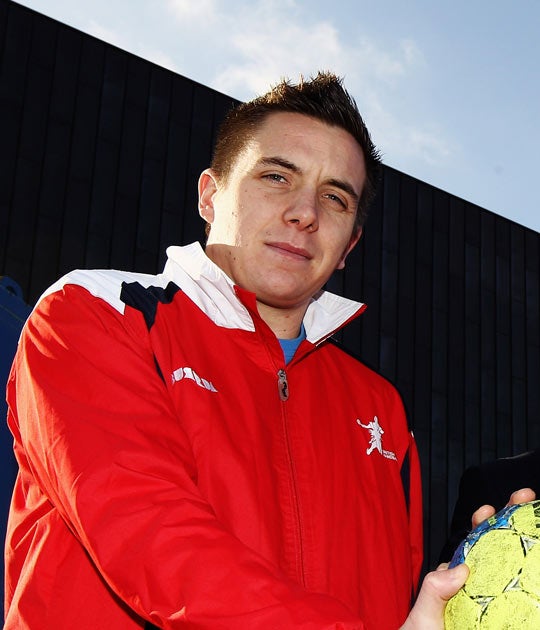Bobby White: 'Four years ago, I didn't even know the rules'
In 2007, Bobby White had barely heard of handball. Next summer, he will captain the British team

Your support helps us to tell the story
From reproductive rights to climate change to Big Tech, The Independent is on the ground when the story is developing. Whether it's investigating the financials of Elon Musk's pro-Trump PAC or producing our latest documentary, 'The A Word', which shines a light on the American women fighting for reproductive rights, we know how important it is to parse out the facts from the messaging.
At such a critical moment in US history, we need reporters on the ground. Your donation allows us to keep sending journalists to speak to both sides of the story.
The Independent is trusted by Americans across the entire political spectrum. And unlike many other quality news outlets, we choose not to lock Americans out of our reporting and analysis with paywalls. We believe quality journalism should be available to everyone, paid for by those who can afford it.
Your support makes all the difference.Any Olympic Games throws up a raft of extraordinary stories – Eric "the Eel" Moussambani could actually have done with one – and one of next year's more remarkable journeys will have a British beginning and end.
It is not far from Northampton to the east end of London, but when Bobby White leads out the British team into the 7,000-capacity Handball Arena in the west of the park it will complete a roundabout route that has taken him from student footballer to Olympic athlete in the space of five years. It has led him via the seventh division of the Danish handball league, the Austrian Alps and the island of Crete through a crash course in a sport that has next to no foundation in this country.
"I feel very lucky," says White, an amiable and enthusiastic 28-year-old whose eyes shine with the conviction of the convert. "There are lots of European countries who are very good at handball but because there are a limited number of Olympic places for European teams they find it hard to qualify. There's me, having only played the sport for a few years, and I'm already on my way to the Olympics because of our automatic qualification spot as the host nation."
In 2007, White was a non-league footballer for Newport Pagnall and a student at Northampton University. One morning he was watching TV before heading for lectures and caught Sir Steve Redgrave promoting Sporting Giants, a programme encouraging under-25s who were over 6ft 3in to try out Olympic sports. White applied and was asked for a trial. "I had really no idea about the sport," he says. "I knew that there's two goals at either end and you had to throw it in but I didn't know anything else. I looked it up on Google and Wikipedia the night before."
What followed was, in his own, and probably understated, words, "a steep learning curve". The fledgling British team, bolstered by White and six others who came through the trials, were based in Denmark, a handball heartland, but funding cuts soon forced the players to find their own clubs. After a spell in Austria, he returned to the Danish academy, where a number of British players were based. They received coaching, board and lodging in return for becoming odd-job men around the site, painting and labouring in between learning their sporting trade.
White is now based in Crete, where his future is again in doubt as the league there struggles to survive in the midst of Greece's economic crisis. It is another obstacle for White to overcome; he has also suffered a serious hip injury and separated from his long-term girlfriend as a result of his peripatetic existence.
It was only a little over a year ago that Britain conjured their first competitive victory, in a dead rubber European Championship qualifier against Bulgaria, but in little more than a year's time – the handball begins on 28 July – that will all have been forgotten.
"It's not been easy along the way," says White. "I've had to make sacrifices, but it is amazing – I'll be playing in the Olympics."
So, what are the rules?
Handball is essentially a mix between basketball and football. Two teams of seven play two 30-minute periods on an indoor pitch that measures 40m by 20m.
Defenders are not allowed to go inside the goalkeeper's area but attacking players may if they jump from the outside. Players are allowed only three steps without dribbling the ball and only a further three steps once they do. They then have only three seconds before they must release it.
Full contact is allowed in the fast-paced sport, as long as it is outside the area and occurs facing the opponent. Typically teams will score at least 20 goals each.
Join our commenting forum
Join thought-provoking conversations, follow other Independent readers and see their replies
Comments